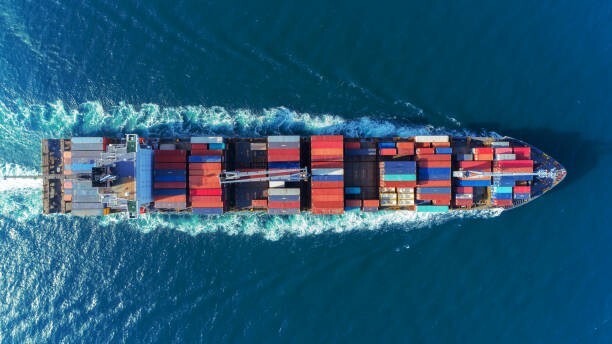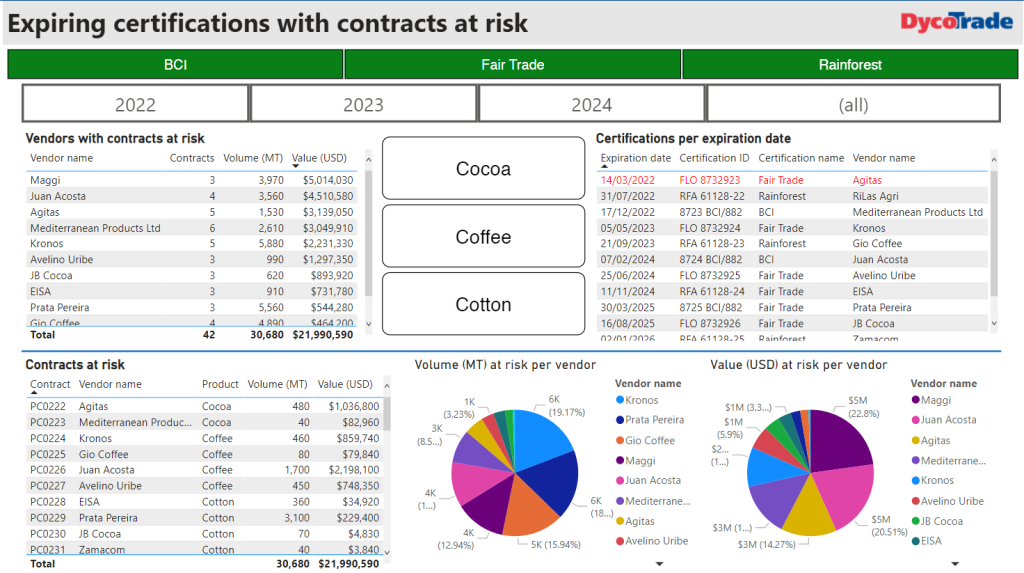How comprehensive is your long-term sustainability strategy?
The following newsletters will help you to better understand the quickly evolving climate space. Commodities, from precious metals to oil and agricultural products, form a central part of our society and economy. They play a key role in the sustainable transition, which explains the growing importance of incorporating ESG (Environmental, Social, and Governance) in commodity trading.
Retailers, food & beverage producers, and consumers increasingly demand traceability information on product origins and sustainable production. They want a variety of questions answered, such as:
- What are the carbon emissions of the products?
- What kind of trade certifications are applied?
- Do any links exist with deforestation, and if so, how can these be improved?
- Does the supply chain have poor labor conditions at farms or processor sites?
At the same time, future developments such as climate change will define the supply of Agri products. Some areas will be severely affected by lower productivity levels caused by droughts or more intense pest control. How can you effectively manage these risks or pro-actively improve the resilience of farmers?
“Everyone needs to be educated on climate change because climate change and our response to it is going to change the world over the next 25 years as much as the internet did in the last 25 years.” — Joe Room
Commodities’ dual role in the green transition

Many commodities are driving the green transition, which transfers into increasing demand for commodities that promote clean energy, like green lithium, and sustainably sourced and ethically produced commodities such as responsible cocoa or palm oil.
On the other hand, commodities can also be negatively affected by the green transition through physical risks like climate-related extreme weather events destroying agricultural products and decreasing demand for commodities that do not support or are negatively affected by the green transition, such as fossil fuels. Furthermore, ESG breaches result in financial losses, reputational damage, and litigation costs.
DycoTrade empowers organizations worldwide to take climate action and achieve their sustainability goals – no matter how ambitious. As your partner in the global commodity trade, you can count on our expertise and comprehensive product portfolio to help you take decisive climate action.

Benefits for the international trade sectors
- Higher and more stable revenues through the identification of sustainable products and markets
- Better farm and business management practices among rural producers and small and medium-sized enterprises (SMEs)
- Improved stakeholder awareness of market trends
- Reduced stakeholder risk exposure to market volatility
- More efficient and strategic natural resource use
- Improved consistency, quality, and supply of products to consumers
- Improved consumer awareness of producer conditions through private sector communication channels
- Improved coordination and efficiency of supply chain management
- Increased private sector investment for sustainable production and consumption
Sustainability is rapidly becoming a factor in commodity trading. Although this mainly started with soft commodities, all other segments quickly followed. We see it as essential for traders to be aware of, for instance, the CO2 footprint of the contract they are working on. How does this fit into their company’s CO2 targets, and which route can best be chosen to protect our environment?
Tracking CO2 Footprint with DycoTrade Logistic Summary Report
![]()
The Logistics Summary Report shows the CO2 footprint based on the shipment routes. The data from the DycoTrade logistic files indicate where goods are moved, and which cargo is moved from these locations. This is then enhanced with CO2 emission data from freight forwarders and shipping companies. The thickness of the line indicates the CO2 footprint of each of these routes or voyages. And by clicking any of these lines, we can drill down into the details to look at specific vessels and their CO2 footprint.
Manage vendor certifications with DycoTrade data & Microsoft PowerBI analytics
DycoTrade has a focus on stability and tracking sustainability. Here we’re looking at an example of a dashboard related to vendor certifications. We see the certifications listed by expiration date and those already expired or marked out in red on the right side.

The dashboard allows you to quickly see which contracts are connected to the vendor certifications and which ones are at risk due to the expiration of a future certificate of a supplier. This is also listed in the two bar charts at the bottom to show you the volume in metric tons at risk per vendor and the value in US dollars at risk per vendor. These charts show which vendors have the most significant impact should their certification expire.
Our robust research, sector knowledge, and scalable tools bring you closer to achieving your sustainability goals. We work in various supply chains, such as tea, cacao, coffee, palm oil, and soy, and on all continents.
DycoTrade helps companies take control of their environmental initiatives by:
- Connecting to real-time data sources
- Accelerating data integration and reporting
- Providing accurate carbon accounting
- Measuring performance vs. goals
- Enable intelligent insights for organizations to take more effective action
- An extensible solution that unifies data intelligence
- Automating manual processes and enabling organizations to more efficiently record, report, and reduce their emissions
- Integrating with any business system
Sustainability means improving the business in all its aspects. By implementing sustainable procedures, the company not only reduces the negative impact on climate and our planet but also gains efficiency.
The topic of our next LinkedIn Newsletter: “Manage Your Trading Relationships with Customer Portals”
Customer Portal is a customer-facing web portal that allows you to efficiently distribute and receive real-time quotes from customers. Effectively manage transparency and flow with your customer base through new tools that enable net pricing on a per contract, per customer basis.
If you want to stay on top of the newest Microsoft & DycoTrade CTRM solutions, subscribe to our monthly LinkedIn Newsletter.


